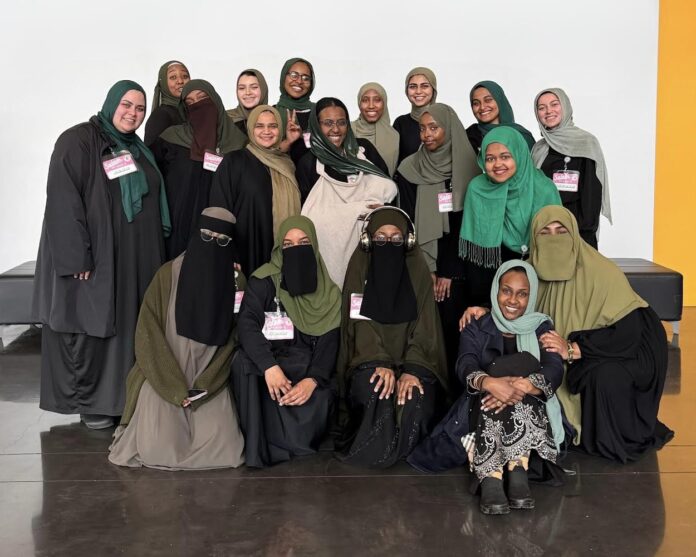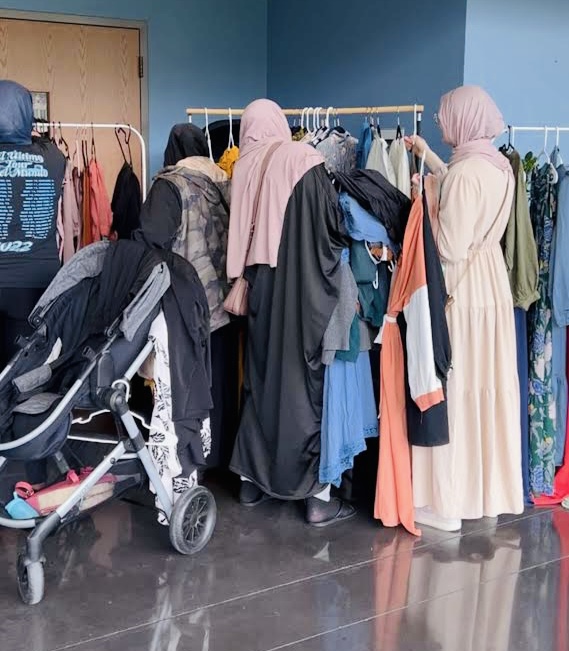
There is a strong overlap between the lack of accessible modest fashion that is sustainable and the harmful environmental waste from fast fashion clothing. Knowing this multifaceted challenge all too well, Fatima Mohamed, a community builder and educator, wasn’t scared of trying something new to be part of a solution. Ahead of Eid, she partnered with Muslim Girls Doing Things, a Kansan City-based non-profit, to make sustainable modest fashion accessible to Muslim girls, while ensuring the festive season of Eid marked by the end of Ramadan was approached with a green mindset, and not through indulgence in consumerism and capitalism plaguing the sacred Islamic celebration.
Fortunately, many ventures can benefit the ever-growing community of Muslim women in the West. Yet, implementing the ideas many girls have to expand their communities can be challenging alone. Muslim Girls Doing Things, or MGDT, of which Fatima is a dedicated member, is bridging the divide between societal initiatives and the barriers that stop girls from simply making friends. Their nonprofit status and growing interest allow them to explore different avenues of sustainability, including sustainable modest fashion initiatives and fostering a healthy connection to Allah and the community.
After college, Muslim girls sometimes struggle to find sisterhood. Where it was previously easy to join random MSA events on-campus or cultural clubs, post-education life can feel like an empty void of loneliness and alienation from the community. In Kansas City, Missouri, MGDT creates safe spaces for Muslim women to meet others and gain a new sense of sisterhood.
On March 31st, MGDT hosted a Modesty Pantry—an open sustainable modest fashion event for women to ‘purchase’ modest clothes, abayas, dresses, skirts, hijabs and prayer outfits. The clothes were collected via several clothing drives urging people to clean their closets of items they hardly wear or never worn.
Read More: Reclaiming Zuhd: Embracing Minimalism in a Wasteful World

“It’s like killing two birds with one stone,” Fatima says, “getting rid of the hoarding of these clothes that would probably end up in a landfill somewhere, and then taking care of these girls who really need these clothes that might not be accessible to them.” She describes the items they collected, saying there were new bags, shoes and even clothes with tags still attached. The need for the Modesty Pantry event, supported by the University of Missouri Kansas City’s MSA and Somali Student Union, is driven by core issues plaguing the modest fashion industry, limiting the options for Muslim women in the West to access modest sustainable clothing.
I think it’s still important to push these things and know what can be improved on. We hear a lot about the BDS movement and everything that’s happening in Palestine and now people are, alhamdulillah, collectively as Ummah, starting to be more conscious of where we put our money. But I think we should also be holding these brands that are selling these clothing accountable too. What about your supply chain? Are Uyghur Muslims making the fabric that you’re selling to a predominantly Muslim audience?
Fatima Mohamed
During the pantry, attendees were given a limit of 5 pieces of clothing and 7 scarves. There was also a ‘Need Love’ section, from which unlimited clothes could be taken, comprising clothes that required minimal fixing due to minor stains or small tears. The event was largely ‘pay-what-you-can’ so that no woman would be singled out based on her financial status. Any funds collected would go towards fundraising for a retreat this upcoming year. MGDT previously held an all-women retreat focusing on reconnecting with Deen. The retreat also focused on building sisterhood and Rahma, or mercy, with each other. They held Islamic skits, prayed and read the Quran together, and spent plenty of time outdoors.
Fatima shared stories of women at the retreat who opted to buy clothes overseas due to the exorbitant prices in the U.S. The modest clothing available locally, together with the rest of fast fashion clothing, is typically made of materials harmful to the environment and fuelling a global waste endemic. Yearly, between 80 and 100 billion new clothing garments are produced globally, but the world produces 92 million tons of textile waste annually. 17 million of those tons are directly from the U.S.
There’s almost a triangle that you have to choose from. It’s either going to be cheap and made from fabric that’s not good for the environment, or it’s going to be expensive and made from good materials… but those materials may not be accessible for everyone. I’m looking forward to seeing a brand that can take care of all of that.
Fatima Mohamed
Read More: Seed-Saving and Community Initiatives Connect Cultures in Metro-Detroit
Fatima adds on to highlight how marketing also drives over-consumption. “When businesses offer ‘buy one get three free,’ I’m not sure we necessarily need that… I think there’s a lot of room for improvement when it comes to marketing and the way that they market their clothing.”
Fatima hopes that more conversations continue around modest fashion and accessibility. “I hope that when people see the Modesty Pantry, they feel inspired to act on that,” she says, hoping that girls are motivated by this initiative to embrace sustainability and start their clothing drives, swapping with friends and reaching out to those in need, like recent converts, women with less funds, or international students. MGDT hopes to release a guide for community members interested in taking similar initiatives in their towns and cities. Fatima shared how Amaal Sheikhadan, a licensed social worker and board member of MGDT, aims to make the initiatives reproducible by anyone who wants to participate.
Initiatives like the Modest Pantry and sustainability programming foster environmental stewardship, and more importantly, allow the community to serve Allah through ibadah (worship) and charitable giving. “There’s a lot of work to be done,” Fatima says, “but I’m very inspired and very hopeful. I think that Allah gave us all the capacity to be able to make the changes that we want to see in the world.”
Read More: Fasting from Consumerism: How to Embrace Minimalism
Fatima Mohamed can be found on Instagram and Tiktok as @ummyoms
MGDT can be found on Instagram as @muslimgirlsdoingthings


